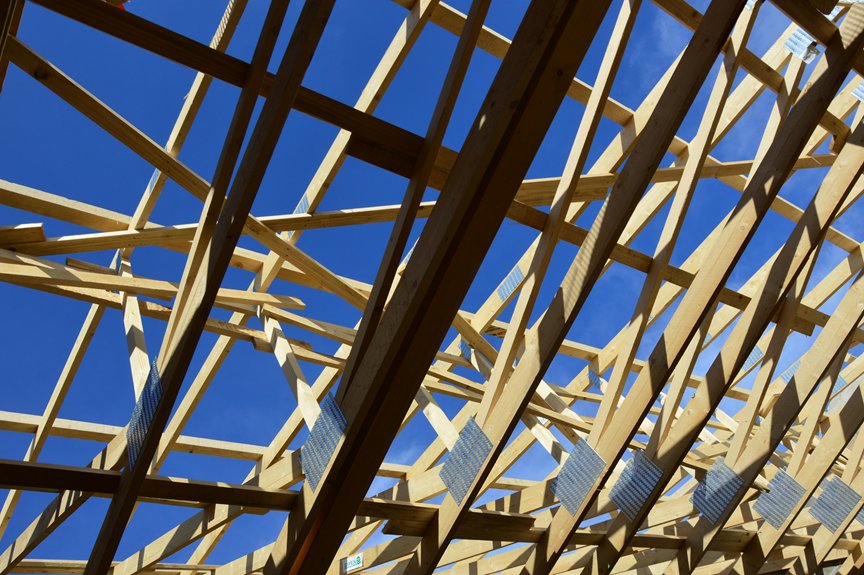As a business owner in Flower Mound, exploring renewable roofing materials offers a strategic way to reduce your environmental footprint and cut energy costs. By considering options like reflective coatings, recycled metals, or green roofs, you can enhance sustainability while potentially increasing property value. However, understanding the full range of eco-friendly choices and their long-term benefits requires a closer look at emerging technologies and innovative solutions that could reshape your roofing approach.
Solar Reflective Coatings and White Roofs
Have you ever wondered how white roofs and solar reflective coatings contribute to energy efficiency and environmental sustainability? These coatings enhance solar reflectivity by reflecting more sunlight than traditional roofing materials, reducing heat absorption. Contact – Top View Roofing offers expert guidance on implementing these eco-friendly solutions. This lower heat gain decreases the need for air conditioning, leading to significant energy savings and reduced greenhouse gas emissions. The white roof benefits extend beyond energy efficiency; they help mitigate urban heat islands, improving local climate conditions. By choosing reflective coatings, you support sustainable building practices that conserve resources and promote eco-conscious development. Implementing these solutions aligns your business with environmentally responsible standards, demonstrating a commitment to reducing your carbon footprint.
Green Roof Systems and Living Roofs
Green roof systems offer significant environmental benefits by reducing urban heat, managing stormwater, and improving air quality.
You’ll find that their maintenance needs are manageable, and their lifespan can surpass traditional roofing when properly cared for.
Considering these factors helps you evaluate the long-term sustainability and ecological impact of living roofs.
Benefits of Green Roofs
Implementing green roof systems and living roofs offers significant environmental and economic benefits that can transform urban spaces. These roofs help reduce the urban heat island effect by cooling surrounding areas, which lowers energy costs and enhances comfort.
Additionally, they improve stormwater management by absorbing and filtering rainwater, decreasing runoff and alleviating pressure on drainage systems. Green roofs also promote biodiversity, providing habitats for various species within city environments.
From an economic perspective, they extend roof lifespan and reduce cooling expenses, offering long-term savings. By integrating these sustainable roofing solutions, you contribute to healthier, more resilient communities while aligning your business with eco-conscious practices.
The combination of environmental impact and cost efficiency makes green roofs an essential component of forward-thinking urban development.
Maintenance and Longevity
Maintaining green roof systems and living roofs is essential to ensuring their long-term performance and environmental benefits. Regular roof inspections help identify potential issues early, such as drainage failures or plant health concerns, allowing prompt intervention.
Implementing weatherproofing techniques is vital to protect the underlying structure from water infiltration and temperature fluctuations, which can undermine roof integrity over time.
Proper maintenance involves monitoring plant growth, removing debris, and ensuring irrigation systems function correctly to sustain vegetation health. Longevity depends on these proactive practices, reducing the risk of costly repairs and extending the roof’s lifespan.
Recycled Metal Roofing Options
Recycled metal roofing options have gained popularity because they offer a sustainable alternative to traditional materials while providing long-lasting durability. These roofs leverage recycled metal, which maintains excellent recycled metal durability, ensuring your building withstands harsh weather conditions for decades.
Additionally, metal roofing aesthetics are highly adaptable, allowing you to choose finishes and styles that complement your business’s identity.
The use of recycled materials reduces landfill waste and conserves natural resources, making it an eco-conscious choice.
Metal roofs also reflect sunlight, lowering cooling costs and decreasing your carbon footprint.
Clay and Terracotta Tiles With Sustainable Features
Since they’re made from natural clay and terracotta, these roofing materials inherently support sustainability by utilizing abundant, renewable resources. Clay and terracotta tiles offer a strong, eco-friendly alternative to synthetic roofing options, reducing reliance on less sustainable materials.
They excel as clay alternatives because of their low embodied energy and natural thermal properties, helping to improve energy efficiency for your building.
Terracotta durability ensures long-lasting performance, often exceeding 50 years with minimal maintenance, which minimizes waste and replacement frequency.
Additionally, these tiles are recyclable at the end of their lifespan, further supporting eco-conscious building practices.
Reclaimed Wood Shingles and Shake Roofing
Reclaimed wood shingles and shake roofing offer a sustainable alternative by repurposing existing materials, reducing the demand for new timber and minimizing environmental impact. This approach supports historic preservation by maintaining the architectural integrity of older structures while giving them new life.
The aesthetic appeal of reclaimed wood enhances visual character, adding warmth and authenticity that modern materials often lack. By choosing reclaimed wood, you contribute to resource conservation and waste reduction, aligning your business with eco-conscious values.
The natural patina and varied textures of reclaimed wood provide a unique, timeless look that complements traditional and rustic designs. Overall, reclaimed wood shingles and shake roofing blend sustainability with heritage preservation, making them an attractive option for environmentally responsible Flower Mound businesses aiming to preserve historic charm.
Eco-Friendly Asphalt Shingles
Eco-friendly asphalt shingles are designed with sustainable manufacturing processes that minimize waste and energy use.
Their recyclable materials help reduce landfill impact and support circular resource systems.
Sustainable Manufacturing Processes
Advancements in manufacturing processes have made eco-friendly asphalt shingles a viable option for sustainable roofing. Manufacturing innovations focus on reducing resource consumption and minimizing waste, directly impacting environmental footprints.
Techniques such as energy-efficient production methods and the integration of renewable energy sources enhance overall sustainability. Additionally, supply chain sustainability plays a vital role; sourcing raw materials responsibly and optimizing logistics reduce carbon emissions and promote eco-conscious practices.
These improvements not only lower environmental impacts but also guarantee consistent quality and durability. By adopting such sustainable manufacturing processes, you can support greener building solutions while aligning with environmental goals.
Recyclable Material Benefits
Have you considered how recyclable materials in asphalt shingles can substantially reduce environmental impact? Recyclable material benefits include decreasing landfill waste and conserving natural resources, making them a sustainable choice for eco-conscious businesses.
These shingles are manufactured through eco friendly manufacturing processes that prioritize material recovery and reuse. By choosing recyclable asphalt shingles, you support a circular lifecycle, minimizing the need for virgin materials and reducing energy consumption during production.
This approach promotes a more sustainable roofing solution that aligns with environmental goals. Additionally, the use of recyclable materials often results in lower emissions during manufacturing, further reducing your carbon footprint.
Embracing recyclable asphalt shingles allows your business to demonstrate environmental responsibility while benefiting from durable, high-quality roofing options.
Reduced Environmental Impact
Choosing asphalt shingles made with eco-friendly materials considerably reduces your building’s environmental footprint. These shingles help mitigate the urban heat island effect by reflecting more sunlight and absorbing less heat, which lowers cooling energy demands.
Additionally, their design supports improved stormwater management by minimizing runoff and preventing pollutants from entering local waterways. Eco-friendly asphalt shingles often incorporate recycled content, decreasing reliance on virgin materials and reducing landfill waste.
Their durability extends the lifespan of your roof, decreasing the frequency of replacements and waste generation. By opting for sustainable asphalt shingles, you actively contribute to a healthier environment, conserve resources, and promote urban resilience.
This choice aligns your business with eco-conscious practices and demonstrates a commitment to sustainability in Flower Mound.
Solar Panel Integrated Roofing Solutions
Integrating solar panels directly into roofing materials offers a sustainable approach to energy generation while maintaining the structural integrity of your home. Solar panel integration enhances efficiency by streamlining energy capture without the need for separate installations, reducing material waste and installation time.
When considering roofing system compatibility, it’s crucial to evaluate how well these integrated solutions align with your existing structure and climate conditions. Modern solar roofing options are designed for durability, weather resistance, and ease of maintenance, ensuring long-term performance.
This approach minimizes visual clutter and preserves aesthetic appeal, making it a practical choice for eco-conscious businesses. Ultimately, solar panel integrated roofing solutions provide a seamless, sustainable, and innovative way to harness renewable energy without compromising your building’s integrity.
Modular and Interlocking Roofing Components
Modular and interlocking roofing components are designed to enhance installation efficiency and adaptability, making them an eco-conscious choice for sustainable building practices. These modular components allow you to quickly assemble roofing sections, reducing waste and construction time.
Interlocking systems improve the durability and weather resistance of your roof by ensuring a tight, secure fit that minimizes leaks and airflow. Because they’re manufactured with sustainability in mind, these components often incorporate recycled or eco-friendly materials, further reducing environmental impact.
Their flexibility enables easy upgrades or repairs, extending roof lifespan and minimizing material waste. By choosing modular components with interlocking systems, you support a more sustainable approach to roofing—one that emphasizes efficiency, durability, and environmental responsibility.
Emerging Technologies in Renewable Roofing
Emerging technologies in renewable roofing are revolutionizing how we harness sustainable energy and reduce environmental impact. Innovations like integrating wind energy systems directly into roofing structures allow you to generate power on-site, maximizing efficiency and reducing reliance on traditional grids.
Additionally, biodegradable roofing materials are gaining traction, offering eco-friendly alternatives that decompose naturally without harming the environment. These advancements not only enhance a building’s sustainability profile but also demonstrate a commitment to ecological responsibility.
Conclusion
By choosing renewable roofing materials, your business can significantly reduce its environmental footprint while enjoying long-term savings and promoting community health. Innovative solutions like green roofs, integrated solar systems, and recycled materials showcase your commitment to sustainability. These eco-friendly options help conserve resources, lower emissions, and enhance urban resilience. To learn more about how to incorporate these sustainable roofing options, or to schedule your free roof inspection, call us at (405) 543-2920 or visit us online at Top View Roofing. Making the switch supports a greener future for Flower Mound and aligns your business with responsible practices that benefit both your bottom line and the planet.


















